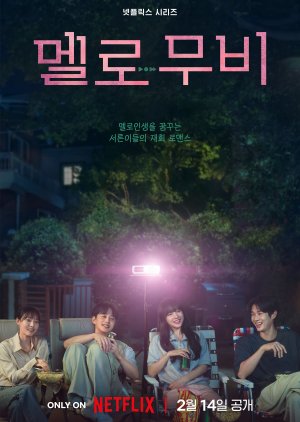 Netflix introduces its wide variety of 2025 K-entertainment lineup
Netflix introduces its wide variety of 2025 K-entertainment lineup - Português (Portugal)
- 한국어
- ภาษาไทย
- Arabic
- Título original: 멜로 무비
- Também conhecido como: Luces, Cámara, ¡Amor! , Mello Mubi , Melro Mubi , Um Amor de Cinema , Как в кино , Як у кіно , حب في عالم الأفلام , หัวใจตึกตัก หนังรักใจฟู
- Diretor: Oh Choong Hwan
- Roteirista: Lee Na Eun
- Gêneros: Romance, Juventude, Drama
Onde assistir Melo Movie
Subscription (sub)
Elenco e Créditos
- Choi Woo ShikKo GyeomPapel Principal
- Park Bo YoungKim Mu BiPapel Principal
- Lee Jun YoungHong Si JunPapel Principal
- Jeon So NeeSon Ju APapel Principal
- Kim Jae WookKo Jun [Ko Gyeom's older brother]Papel Secundário
- Cha Woo MinWoo Jeong Hu [Mu Bi's childhood friend]Papel Secundário
Resenhas

Modo Dorameira
Classificação:- Comédia romântica dramatica;
- Profições da industria do cinema;
- Família;
- Beijos/ carinho ou contato fisico: ⭐⭐⭐3/5.
Resenha:
Aqui, a história foca na vida cotidiana dos personagens, explorando o dia a dia de pessoas que trabalham com cinema, lidando com grandes histórias familiares e personagens secundários. Embora a história de amor pareça ser o foco principal, ela na verdade serve como plano de fundo para as trajetórias individuais dos protagonistas. Como muitos dramas, ele transmite a ideia de que, apesar das dificuldades, a vida pode ser realmente bela.
Esta resenha foi útil para você?

Esta resenha pode conter spoilers
A Drama So Beautiful.. I Would Rewatch For The Visuals Alone..
Melo Movie might fall under the Rom-Com genre.. But its more than just a romantic story.. The depth it carries evokes strong emotions.. The drama had so many beautiful bonds and I loved how seamlessly they wrapped up the story in just 10 episodes.. Loved the main couple and their dynamic.. They each carried their own baggage and yet they gave each other the space to figure things out on their own.. Choi Woo Shik, Park Bo Young, and Kim Jae Wook all in one drama?? There was no shortage of memorable performances.. They were just too good.. Whenever a drama with Kim Jae Wook comes out I am always dumbfounded by how underappreciated he is.. With the talent he has, he should be far more sought after and have had way more dramas in his career.. He is nothing short of a brilliant actor and Melo Movie just proves that.."Life seems to have a fixed amount of happiness..
In another sense, there is also a set amount of misfortunes.. "
"Its simple.. If someone suffers a string of hardships, they should believe that good things will come soon.. "
First kiss in the very first episode?? In the snow?? And then the male lead disappears right after?? What a way to end the first episode..
"Just like that the dark night passed.. And dawn arrived.. And Ko Gyeom disappeared just like that.. "
Without any context his disappearance was such an interesting plot twist.. But the car drowning scene hinted at a backstory.. One that obviously had to exist.. Otherwise there is no coming back for him from this..
" I know I sound crazy.. But that day Ko Gyeom looked like someone returning home from a long trip.. I thought I saw a sense of relief and inexplicable exhaustion in him.. "
I didnt like Son Ju A and I hated how she coincidentally met Mubee at a bar and they just became friends.. That was such a cliche.. I didnt like her character overall.. She was honestly annoying.. The way she treated Hong Si Jun after becoming successful was just not what I expected.. And cutting off even the ML who was her friend was just too heartless.. What I hated even more was how she had the audacity to barge back into his life after her success.. I felt sorry for Hong Si Jun.. He had a family who never even tried to understand him and a girlfriend who did everything in the name of love without ever truly opening up to him.. Only to leave him suffering in the end.. She never tried to change him.. Never tried to guide him.. Just kept praising him.. The moment she realized she would drown with him she just left.. He himself didn’t know how to navigate life or how to fulfill his passion.. He lacked a guide.. He lacked any real sense of meaning..
Episode 7 was hands down the best of the entire drama.. In that one single episode the whole story found its meaning..
"Are you busy right now?"
"I have never been busy in my life."
Choi Woo Shik and his comedy were on point.. He is easily one of the best in the Rom-Com genre..
Two of my favorite scenes in the drama were when they finally accepted their feelings for each other and kissed near the sunflower field.. And the hug scene at the park.. Perfectly synced with the scene playing on the screen in the background.. I loved the framing of the park scene so much that I rewatched it several times.. It was just that impressive..
"There’s no one at home.. No one’s home, Mubee."
They portrayed the grief of losing someone so realistically.. The way he tries to act okay.. Yet even the smallest things like returning to a house without his brother bring a wave of sadness.. And the fact that Mubee could resonate with his emotions made it even more heartbreaking.. Its true that Mubee finds Gyeom at his lowest points.. She truly was the luck that followed his misfortune..
'' Visit me in my dreams from time to time.. ''
Special shoutout to Ko Jun.. This has to be KJW’s most tragic character to date.. After losing their parents and becoming an orphan, he took on the role of the provider and guardian to his younger brother when he himself was still young.. Dedicated his entire life to him.. Only to pass away tragically just when he finally realized he wanted to live..
Overall Melo Movie was an emotional rollercoaster.. Heartwarming yet heartbreaking.. It reflects how life itself carries multiple genres.. Its never just suffering and misfortune.. Happiness finds its way too..
The cinematography in Melo Movie was beautiful.. I would rewatch the drama just to take in those visuals again..
Esta resenha foi útil para você?















 1
1 4
4







































